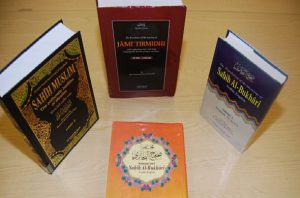By Abu Ameenah Bilal Philips
The Prophet’s sayings and actions (the Hadith) were primarily based on revelation from Allah and, as such, must be considered a fundamental source of guidance second only to the Qur’an. Allah in the Qur’an said concerning the Prophet (peace be upon him):

It is largely due to the science of Hadith that the final message of Islam has been preserved in it is original purity for all times.
(Muhammad) does not speak from his desires; indeed, what he says is revelation. (An-Najm 53:3-4)
1- Revelation
Therefore, the Hadith represents a personal source of divine guidance which Allah granted His Prophet (peace be upon him) which was similar in its nature to the Qur’an itself. The Prophet reiterated this point in one of his recorded statements,
“Indeed, I was given the Qur’an and something similar to it along with it.” (Abu Dawud)
2- Tafseer
The preservation of the Qur’an was not restricted to protecting its wording from change. Were that the case, its meanings could be manipulated according to human desires, while maintaining its wording.
However, Allah also protected its essential meanings from change by entrusting the explanation of the meanings of Qur’an to the Prophet himself. Allah states the following in the Qur’an regarding its interpretation:
And I revealed to you the Reminder (Qur’an) in order that you explain to the people what was revealed to them. (An-Nahl 16:44)
Therefore, if one is to understand the meanings of Qur’an, he or she must consider what the Prophet (peace be upon him) said or did regarding it. E.g. in the Qur’an, Allah instructs the believers to offer salah (formal prayers) and pay zakah (obligatory charity) in Surat Al-Baqarah:
And establish worship, pay the poor-due, and bow your heads with those who bow (in worship). (Al-Baqarah 2:43)
However, in order to obey these instructions correctly, one must study the methodology of the Prophet in this regard. Among his many clarifications concerning Salah and zakah, he instructed his followers saying “Pray as you saw me pray,” (Al-Bukhari) and he specified that 2.5% of surplus wealth, unused for a year, should be given as zakah.
There are a number of authentic hadiths in which the Prophet gave specific instructions concerning the items and quantities on which zakah was due, as well as the time it is due. Among them is the following narration from `Ali ibn Abi Talib:
`Ali ibn Abi Talib quoted Allah’s Messenger (peace be upon him) as saying: “Whenever you possess 200 dirhams and a year passes on it, 5 dirhams is to be paid on it. You are not liable to pay anything until you possess 20 dinars and a year passes on it, in which case ½ a dinar is due. Whatever exceeds that will be counted likewise. And no zakah is payable on wealth until a year passes on it.” (Abu Dawud)
3- Laws
One of the primary duties of the Prophet (peace be upon him) was to judge between people in their disputes. Since his judgments were all based on revelation, as stated earlier, they must be considered a primary source of principles by which judgments are carried out in an Islamic State. Allah also addressed this responsibility in the Qur’an saying:
O believers obey Allah, obey the Messenger and those in authority among you. If you dispute about anything, refer it to Allah and the Messenger. (An-Nisaa’ 4:59)
Thus, hadiths are essential for the smooth running of the law courts in an Islamic State.
4- Moral Ideal
Since the Prophet (peace be upon him) was guided by revelation in his personal life, his character and social interactions became prime examples of moral conduct for Muslims until the Last Day. Attention was drawn to this fact in the following Qur’anic verse:
Surely there is for all of you a good example (of conduct) in the way of Allah’s Messenger. (Al-Ahzab 33:21)
Consequently, the daily life of the Prophet as recorded in Hadith represents an ideal code of good conduct. In fact, when the Prophet’s wife,`A’ishah, was asked about his conduct, she replied, “His character was the Qur’an.” (Ahmad)
5- Preservation of Islam
The science of narration, collection and criticism of Hadith was unknown to the world prior to the era of the Prophet (peace be upon him).
In fact, it was due in part to the absence of such a reliable science that the messages of the former prophets became lost or distorted in the generations that followed them. Therefore, it may be said that it is largely due to the science of Hadith that the final message of Islam has been preserved in it is original purity for all times. This is alluded to in the Qur’anic verse:
Indeed, I have revealed the Reminder, I will, indeed, protect it. (Al-Hijr 15:9)
_________________________
The article is an excerpt from the author’s book “Usool Al-Hadith”.
Dr. Abu Ameenah Bilal Philips was born in Jamaica, but grew up in Canada, where he accepted Islam in 1972. He completed a diploma in Arabic and a B.A. from the College of Islamic Disciplines (Usool Ad-Deen) at the Islamic University of Madinah in 1979. At the University of Riyadh, College of Education, he completed a M.A. in Islamic Theology in 1985, and in in 1994 at the University of Wales, the department of Islamic Studies he completed a Ph.D. in Islamic Theology.
 Arabic
Arabic English
English Spanish
Spanish Russian
Russian Romanian
Romanian Hindi
Hindi Tagalog
Tagalog Bengali
Bengali Sinhalese
Sinhalese Nepali
Nepali

